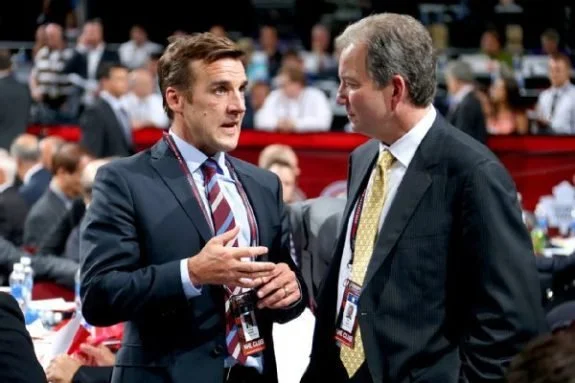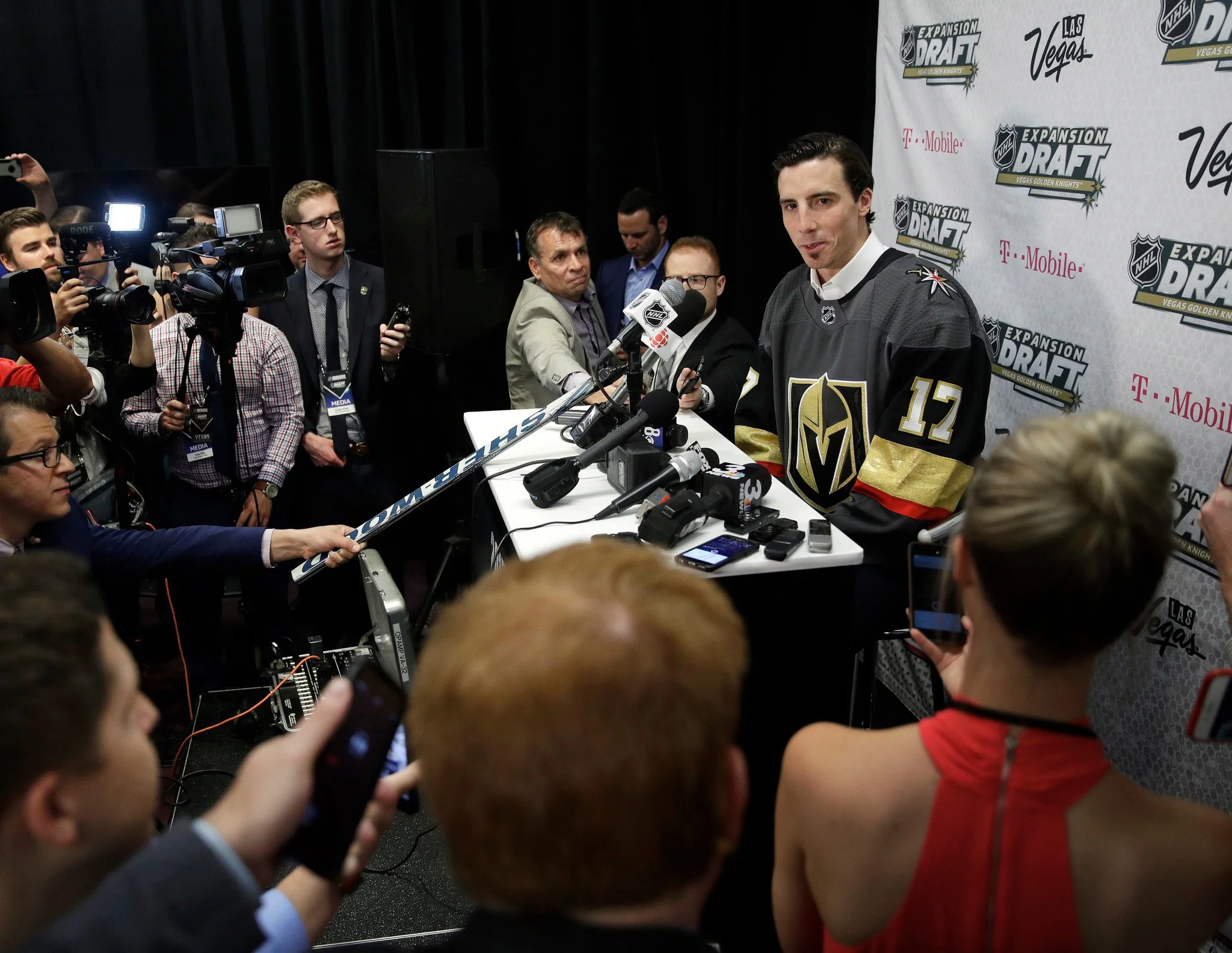Recency Bias: Why Kraken, Knights Avoided Expansion Fate
Like isn’t fair. That’s the triusm. For fans of established NHL teams the sight of the Vegas Golden Knights and Seattle Kraken still in the playoffs— while their own teams are playing golf— is a little galling. Aren’t expansion teams supposed to lose a lot for a long time before gaining success?
The Washington Capitals in their debut season of 1974-75 posted the worst single-season record ever at 8-67-5. (Imagine how much worse the losing if this occurred before the demise of ties?) The Caps never won two consecutive games; their 21 total points were half that of their expansion brethren, the Kansas City Scouts; their .131 winning percentage is still the worst in NHL history, and they lost 37 straight road games.
Only marginally better were the 1992-93 expansion Ottawa Senators, who brought the NHL back to Canada’s capital after the first Senators team folded in 1934. The team recorded three NHL records that season: longest home losing streak of eleven; longest road losing streak with a total of 39 (nearly the whole season) and fewest road wins in a season, with just one victory.
In the same year of 1992-92, the San Jose Sharks, a hybrid expansion team in its first year after leaving Cleveland, posted a brutal 11-71-2 mark. The Sharks allowed 10 or more goals in a game three times and finished the season 22nd in both scoring (219 goals for) and goaltending (359 goals against).
And so on. The 2000-01 Atlanta Thrashers went 14-57-7. The 1972-73 New York Islanders were a putrid 12-60-6 in their inaugural NHL campaign. (At least the Islanders paid off their fans for the abysmal start, winning the Stanley Cup within eight years and preceding to rip off four straight Cups from 1980-83.) The Caps took till 2018 to get a Cup. Kansas City moved to become the Colorado Rockies and then the New Jersey Devils before becoming a huge success with three Cups in 1995, 2000 and 2003. The Sharks and Senators have no championships at all.
Many had predicted similar failure for the Knights. But it didn’t happen that way. Nor did it go sideways in Seattle, either. For one, the enormous $500M Vegas/ $650M Seattle expansion fees demanded some competitiveness. Then, cap pressure from Gary Bettman’s salary cap forced established teams into bad decisions, forcing teams to be creative when they could not pay their stars more money. So clubs began handing out no-movement clauses (NMC) and no-trade-clauses (NTC) like Halloween candy in lieu of salary. These alterations would get their revenge in the Vegas Golden Knights expansion fiasco (for teams).
To guarantee a fair expansion draft process for the Golden Knights the league hired former Vancouver assistant GM Laurence Gilman to design a protocol for the selections. What he found did not exactly correspond to the assignment letter: “It was called an expansion draft, but an expansion draft is what occurred in 2001 when Minnesota and Columbus selected players between them. This was an asset-harvest event. Las Vegas wasn’t competing with another franchise and had the ability to map out exactly what they wanted to harvest.”
That they did. In 2016, the Knights had hired former player and ex-Washington Capitals GM George McPhee, who had from 1997 to 2014 orchestrated the building of the Caps from sad sacks to contenders. McPhee then hired personnel specialist Kelly McCrimmon to be his right-hand man in the process. By 2017, McPhee and McCrimmon understood how the expansion game was changed by issues such as NMCs and NTCs. In 2017, there were 66 NHL players who owned a NMC in their contracts, requiring them to be protected by their clubs in the expansion draft— even if those clubs would rather get out from under their contracts.
Columbus had given goalie Sergei Bobrovsky, Brandon Dubinsky, Nick Foligno and Scott Hartnell contracts with no-move-clauses, long before GM Jarmo Kekalainen had contemplated expansion ramifications, and they suffered the consequences as a result. Enter McPhee who worked a deal where Vegas would select William Karlsson -- who had just one goal in his final 43 games in Columbus -- while also receiving a first-round pick, a second-round pick and David Clarkson’s expensive contract. Karlsson would score 43 goals and 78 points in the Knights first season. The two draft picks would be turned into a deal for Nick Suzuki and, eventually, Max Pacioretty.
McPhee then targeted Anaheim. The Ducks were forced to protect Kevin Bieksa who didn’t have much hockey time left. The NMC in his contract required protection over younger teammates like Theodore, Josh Manson and Sami Vatanen. So Anaheim traded defenceman Shea Theodore to Vegas so Vegas would draft Clayton Stoner instead of one of their prime prospects. And so on.
The Knights exploitation of NMCs and NTCs turned trading from a trickle into a fire hose, making 10 trades before and after the 2017 draft. That yielded 12 draft picks, while also adding valuable pieces in Marc-Andre Fleury, Shea Theodore, Karlsson, Reilly Smith, Jonathan Marchessault and Alex Tuch as part of those deals.
Vegas became the best expansion team in any major pro sport ever. The newest team in the NHL has missed the postseason just once since its arrival in 2017-18, in 2022. This while Buffalo, Detroit and Ottawa have missed every postseason in that span, while Anaheim and New Jersey have just one playoff appearance since the Knights’ first season. Naturally this success did not go over well with those clubs and others who felt Vegas needed to pay some dues before becoming a regular in the playoffs.
So when it came time for Seattle Kraken to build their first roster the sentiment around there NHL was “let’s not do that again”. For example, the Kraken wouldn’t get a crack at the Knights’ roster— they were exempted from the expansion draft process. One other specific change was in the number of NMC and NTC players. After 68 in 2017, there would be just 52 players in that position when the Kraken made their selections in 2021. In short, there were fewer opportunities to pluck cap-strapped teams for players like Karlsson and Marchessault.
The lack of depth on the Kraken showed initially. Seattle wound up 15th in the Western Conference with just 60 points and a minus-69 goal differential. Comparisons to the Knights proved premature. It took another offseason for the Kraken to be competitive. But Matty Beniers is a leading Calder Trophy candidate; it looks like he will be a foundational piece for this fledgling franchise. Vegas and Seattle duelled for the leadership of the Pacific Division all season before Vegas prevailed.
Now they’re in the postseason with the Knights, playing on equal footing with the best. Few players remain from that first Knights team, and few more with the Kraken. But the results remain the same.
Sign up today for Not The Public Broadcaster newsletters. Hot takes/ cool slants on sports and current affairs. Have the latest columns delivered to your mail box. Tell your friends to join, too. Always provocative, always independent. https://share.hsforms.com/16edbhhC3TTKg6jAaRyP7rActsj5
Bruce Dowbiggin @dowbboy is the editor of Not The Public Broadcaster A two-time winner of the Gemini Award as Canada's top television sports broadcaster, he’s a regular contributor to Sirius XM Canada Talks Ch. 167. Inexact Science: The Six Most Compelling Draft Years In NHL History, his new book with his son Evan, was voted the seventh-best professional hockey book of all time by bookauthority.org . His 2004 book Money Players was voted sixth best on the same list, and is available via http://brucedowbigginbooks.ca/book-personalaccount.aspx





